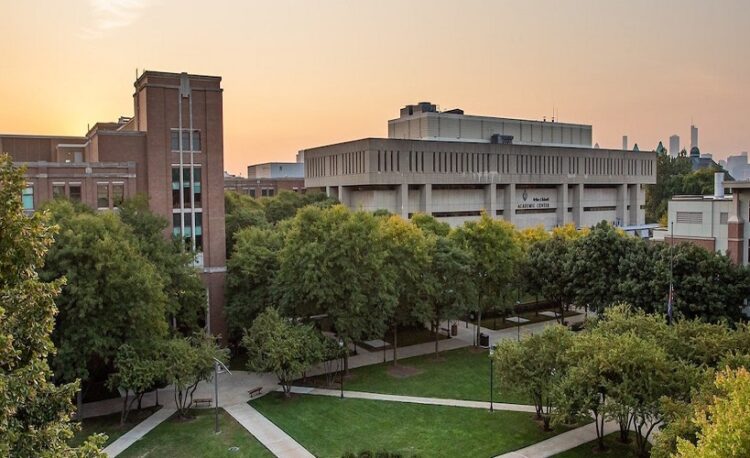Overview
DePaul University is a private Catholic research institution situated in Chicago, Illinois. Established by the Vincentians in 1898, the university derives its name from the 17th-century French priest Saint Vincent de Paul. In 1998, it became the largest Catholic university in North America based on enrollment. Remaining true to its founders' vision, DePaul places a particular emphasis on recruiting first-generation students and individuals from disadvantaged backgrounds.
DePaul operates across two campuses in Lincoln Park and the Loop. The Lincoln Park campus hosts the Colleges of Liberal Arts and Social Sciences, Science and Health, and Education. It is also home to the School of Music, The Theater School, and the John T. Richardson Library. The Loop campus accommodates the College of Communication, Computing and Digital Media, the College of Law, as well as the School of Public Service and the School for New Learning. Additionally, it houses the Kellstadt Graduate School of Business, Loop Library, Rinn Law Library, and the Barnes and Noble-based Student Center. DePaul holds the classification of "R2: Doctoral Universities – High research activity."
The university has an enrollment of approximately 14,500 undergraduates and 7,900 graduate/law students. As indicated by the Division of Student Affairs website, about 90% of DePaul's students either commute or reside off-campus. The student body is diverse, representing various religious, ethnic, and geographical backgrounds, including over 60 foreign countries.
DePaul's intercollegiate athletic teams, known as the DePaul Blue Demons, participate in the Big East Conference. The men's basketball team has a notable record with 18 NCAA tournament appearances and two Final Fours. The softball team achieved its third consecutive Big East Tournament title and made its 21st NCAA Tournament appearance in 2019, under the guidance of head coach Tracie Adix-Zins.
Academic Rankings and Reputation
National Rankings:
- Forbes: 244
- THE / WSJ: 221
- U.S. News & World Report: 124
- Washington Monthly: 240
Global Rankings:
- U.S. News & World Report: 1303
DePaul University, operating on a quarter system (except for the College of Law, which follows a semester system), comprises ten colleges and schools. Notably, the Driehaus College of Business, housing the Kellstadt Graduate School of Business, stands out for its rich history and academic achievements.
Driehaus College of Business: Situated at State and Jackson in the Chicago Loop, the Driehaus College of Business traces its roots back to the opening of DePaul's College of Commerce on January 11, 1913. Renamed the Driehaus College of Business in 2012, following a landmark $30 million gift from alumnus Richard H. Driehaus, it is among the ten oldest business schools in the U.S.
The college boasts a distinguished faculty of around 130 members. In 2009, the entrepreneurship program earned high recognition from the Princeton Review, ranking #3 among graduate programs and #8 among undergraduate programs nationally. DePaul's entrepreneurship program consistently receives accolades, with Entrepreneur magazine recognizing it as one of the best in the U.S.
Renowned professors, including behavioral finance pioneer Werner DeBondt, real estate expert James Shilling, and entrepreneurship expert Harold P. Welsch, contribute to the college's academic excellence. The part-time MBA program at the Kellstadt Graduate School of Business has secured a spot in the top-10 nationally 14 times according to U.S. News & World Report. BusinessWeek also recognized the undergraduate program as one of the best 'Return On Investments' for Private Schools in 2010, ranking 40th overall and making it the second highest-ranked business school in Illinois.
Organisational Structure
DePaul University, like many academic institutions, is organized into various departments that align with specific academic disciplines and areas of expertise. Departments play a crucial role in delivering educational programs, conducting research, and contributing to the overall mission of the university. While the specific departments may vary across colleges and schools within DePaul, here is a general overview of the types of departments commonly found in universities:
- Academic Departments:
- Department of English: Offers programs in literature, writing, and language studies.
- Department of Mathematics: Focuses on mathematical theory, applications, and research.
- Department of History: Explores historical events, cultures, and social changes.
- Department of Psychology: Covers various aspects of human behavior, cognition, and mental processes.
- Department of Computer Science: Focuses on computer programming, software development, and technology.
- Science and Health Departments:
- Department of Biological Sciences: Specializes in the study of living organisms and ecosystems.
- Department of Chemistry: Focuses on chemical principles, research, and laboratory work.
- Department of Physics: Explores the principles of physics, including mechanics, electromagnetism, and thermodynamics.
- Business and Management Departments:
- Department of Accounting: Offers courses in financial and managerial accounting.
- Department of Marketing: Focuses on marketing strategies, consumer behavior, and market research.
- Department of Finance: Covers financial management, investment, and economic principles.
- Law School Departments:
- Department of Legal Studies: Offers courses in constitutional law, criminal law, and legal research.
- Department of Business Law: Specializes in corporate law, contracts, and commercial transactions.
- Communication and Media Departments:
- Department of Communication Studies: Focuses on communication theory, media studies, and public relations.
- Department of Journalism: Offers courses in journalism ethics, reporting, and multimedia storytelling.
- Arts and Music Departments:
- Department of Art and Design: Covers visual arts, graphic design, and studio art.
- School of Music: Offers programs in music performance, composition, and music education.
- Education Departments:
- Department of Education: Prepares future educators with courses in teaching methods, curriculum development, and classroom management.
- Language and Literature Departments:
- Department of Modern Languages: Offers courses in various modern languages and cultural studies.
- Department of Literature: Focuses on the study of literature, literary theory, and critical analysis.
These departmental structures are generalized and may vary based on the specific colleges and schools within DePaul University. Each department is typically led by a department chair or head, and faculty members within each department contribute to teaching, research, and service activities. The collaboration between departments and interdisciplinary initiatives contributes to the holistic education and research environment at DePaul.


